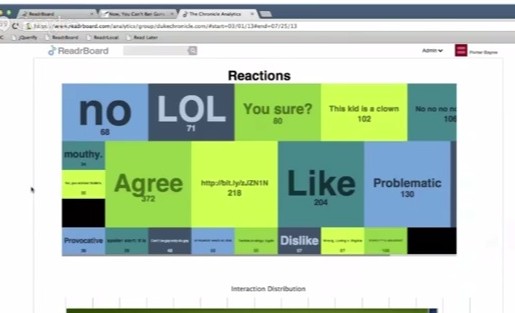Reported by Reuben Stern, Olga Kyle, Sarah Harkins and Chelsea Stuart.
This week, the Reynolds Journalism Institute shows five ways people are trying to make online user comments a thing of real value to both audiences and journalists.
1. Fiskkit is a system in development that allows users to highlight and respond directly to specific sections of an article and is specifically geared toward collective fact checking of questionable material. Founder and Chief Executive Officer John Pettus explains how it works.
[To skip directly to this segment in YouTube, click here.]
2. ReadrBoard also uses an in-line commenting system but lets readers react more quickly by just clicking. It also seeks to provide a sense of what each member may be reading and thinking. We speak with Co-founder Porter Bayne to see how it differs from other commenting systems.
[To skip directly to this segment in YouTube, click here.]
3. Disqus is a plugin that powers commenting for more than 3 million websites. By creating a single account, a user can comment on any site connected to the service. Disqus VP of Marketing and Communications Steve Roy and Product Manager for Engagement Kathy Simpson share how comment technology can help build community.
[To skip directly to this segment in YouTube, click here.]
4. Gawker Media has a proprietary commenting system called Kinja that treats audience members as partners is story creation. We hear about the approach from Lauren Bertolini, community development manager at Gawker Media.
[To skip directly to this segment in YouTube, click here.]
5. The New York Times employs a dedicated team of comment moderators, along with some technical automation, to help useful comments find their way to the top. Community Manager Bassey Etim explains how they work to improve the quality of the conversation.
[To skip directly to this segment in YouTube, click here.]
Quartz is another news organization that has introduced comment annotation throughout the margins of their articles. Read more about what they are considering their beta release of this feature here.
ProPublica has implemented annotated commenting with ReadrBoard. This article about gun control demonstrates the way users can create their own interactions to further a story’s content.
This Q&A with Disqus Founder Daniel Ha explains how the company grew from a dorm room discussion into a leader in blog comment systems. (ReadWrite)
Gawker Media Founder and Chief Executive of Nick Denton discusses how the commenting platform Kinja invites users to be a bigger part of the comment conversations. (The New York Times)
Gawker is also experimenting with native advertising in their comments, recently with the help of celebrity scientist Bill Nye.
Like Disqus, Gawker’s online commenting system allows users to embed multimedia content, as in the GIFs and images shared by users in this story on the world’s tallest waterslide.
For details on how The New York Times determines which articles have comments, read Community Manager Bassey Etim’s explanation.
Reuben Stern is the deputy director of the Futures Lab at the Reynolds Journalism Institute and host and co-producer of the weekly Futures Lab video update.
The Reynolds Journalism Institute’s Futures Lab video update features a roundup of fresh ideas, techniques and developments to help spark innovation and change in newsrooms across all media platforms. Visit the RJI website for the full archive of Futures Lab videos, or download the iPad app to watch the show wherever you go. You can also sign up to receive email notification of each new episode.


